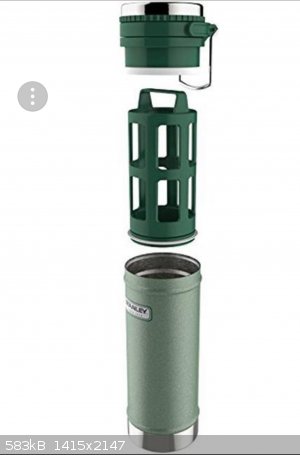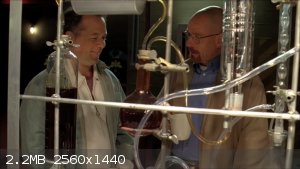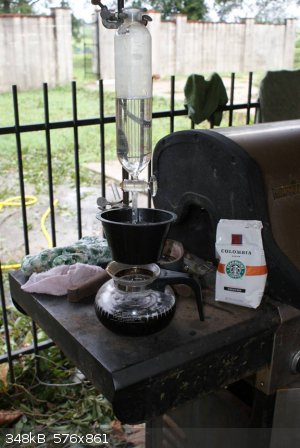MJ101
Hazard to Self
 
Posts: 82
Registered: 14-6-2018
Member Is Offline
Mood: Always Sunny
|
|
Coffee Chemistry - What makes it taste so good. :)
Hi All,
This isn't a thread about which is better. Some drink coffee and some drink tea. Myself I'm a coffee drinker, so I'd like to know more about it.
I was reading an article about the physics and chemistry of Coffee.
https://www.smithsonianmag.com/science-nature/science-behind...
It's really fascinating stuff. Okay. Maybe to me because I'm new to Chemistry. But I'd really like to know about the inner workings of Coffee, and
what makes it taste like it does.
Also, I would expect that the rules that apply to making coffee would also apply (at least in part) to making tea. 
I would really enjoy seeing a discussion about this. Especially from the point of experienced chemists.
TIA for reading this.
|
|
|
Tsjerk
International Hazard
    
Posts: 3022
Registered: 20-4-2005
Location: Netherlands
Member Is Offline
Mood: Mood
|
|
Good topic, a good friend of mine selles cold drip coffee, and makes a living out of it. Because of the low temperature no fats are extracted from
the beans
|
|
|
JJay
International Hazard
    
Posts: 3440
Registered: 15-10-2015
Member Is Offline
|
|
I tried cold drip coffee, and I actually think hot drip coffee is better. *shrug*
I think that Americanos taste better than drip coffees due partly to low tannin content.
|
|
|
Outer
Harmless

Posts: 38
Registered: 24-11-2008
Member Is Offline
Mood: No Mood
|
|
See for example the next article:
"Coffee Chemistry: Coffee Aroma",
http://www.coffeeresearch.org/science/aromamain.htm
|
|
|
stamasd
Hazard to Others
  
Posts: 133
Registered: 24-5-2018
Location: in the crosshairs
Member Is Offline
Mood: moody
|
|
I don't know what makes coffee taste good, but I can tell you what makes it taste bad: over-roasting it. I can't stand the bitterness of "French" or
"Italian" dark roasts. They taste like charcoal. I'll take an espresso made with a very light roast any day over a dark roast one.
Let the fighting begin. 
(As a supplement to the above - paradoxically I prefer a smoky, roasted flavor in my tea. I'll have a Lapsang Souchong with a drop of milk,
thankyouverymuch)
[Edited on 19-6-2018 by stamasd]
|
|
|
Bert
Super Administrator
        
Posts: 2821
Registered: 12-3-2004
Member Is Offline
Mood: " I think we are all going to die. I think that love is an illusion. We are flawed, my darling".
|
|
A couple of ways I make coffee.
(If you are doing a hot extraction, use hot water, but not BOILING hot)
I generally do a small "Stanley" press pot, I'm writing this while 1st of the day steeps.
I boil about a litre of water in an electric kettle, then add a splash of cold water (measured, about 100ml, my cold tap water is about 17C) to the
boiling water before pouring onto COARSELY ground coffee, 2 level Tablespoons. Wait 5 minutes and slowly push down the filter... Then maybe put a shot
of sweetened condensed milk in a glass with ice and pour the hot coffee over, this time of year for a Vietnamese style iced coffee.
I'll check the water temperature going into the press and weigh the dry coffee on the next one I make, this is science, damnit!
And sun coffee. I grind the beans very fine, put 4 oz into a 1/2 gallon clear glass "Mason" jar with cold water to fill. Screw on the lid, sit in
sunlight for about 2 to 3 hours (no longer). Filter through paper immediately when removed from sun and keep the filtrate in a sealed clean jar in
the refrigerator for my occasion. Equally good as iced coffee or microwaved a cup at a time to just shy of the temperature which would cause tissue
dammage on ingestion for a hot coffee. Less bitter than brewed coffee and keeps the volatile lost in most hot water processes. Extracts a bit more of
the caffeine than a short contact hot water method, as far as I can tell.

Rapopart’s Rules for critical commentary:
1. Attempt to re-express your target’s position so clearly, vividly and fairly that your target says: “Thanks, I wish I’d thought of putting it
that way.”
2. List any points of agreement (especially if they are not matters of general or widespread agreement).
3. Mention anything you have learned from your target.
4. Only then are you permitted to say so much as a word of rebuttal or criticism.
Anatol Rapoport was a Russian-born American mathematical psychologist (1911-2007).
|
|
|
MJ101
Hazard to Self
 
Posts: 82
Registered: 14-6-2018
Member Is Offline
Mood: Always Sunny
|
|
@Bert: That's a keeper. I never knew that Stanley made a french press. 
|
|
|
Texium
Administrator
       
Posts: 4508
Registered: 11-1-2014
Location: Salt Lake City
Member Is Offline
Mood: PhD candidate!
|
|
I'm not a man of the bean, but I drink a lot of black tea- earl grey, darjeeling, assam, you name it. I always steep loose leaves in a stainless steel
infuser for 2 to 3 minutes with 80ºC distilled water. This reliably produces a clean, strong, and flavorful brew. Tea leaves can actually be reused 2
or 3 times when they are treated this way. Each successive steeping is a little lighter in color, but still pleasantly flavorful. I do oolong
sometimes as well, but that only requires a minute of steeping and stays very light in color. I'm still trying to figure out the ideal conditions for
it.
|
|
|
MJ101
Hazard to Self
 
Posts: 82
Registered: 14-6-2018
Member Is Offline
Mood: Always Sunny
|
|
@Texium (zts16): I too like teas. Like coffee, there's a time and place for either beverage. 
I think that the water purity is an important factor, especially for the reaction to be repeatable.
I have one of these.
https://www.propurusa.com/Propur-Traveler-System-Gravity-Fil...
It makes a big difference in the taste of everything I cook. And I use the water to make coffee. 
For coffee, the finer the grind, the more "product" you recover. And the solvent temperature is important.
(Does this also hold true for teas?)
This is looking more and more like an organic synthesis to me. 
I have an old Krupps coffee machine that can be stripped and turned into a prototype.
I would think that two things would need to be controlled: Temperature and flow rate.
(I smell a PIC design in the air.  ) )
...
|
|
|
Bert
Super Administrator
        
Posts: 2821
Registered: 12-3-2004
Member Is Offline
Mood: " I think we are all going to die. I think that love is an illusion. We are flawed, my darling".
|
|
For some reason this keeps popping up in my mind.

Rapopart’s Rules for critical commentary:
1. Attempt to re-express your target’s position so clearly, vividly and fairly that your target says: “Thanks, I wish I’d thought of putting it
that way.”
2. List any points of agreement (especially if they are not matters of general or widespread agreement).
3. Mention anything you have learned from your target.
4. Only then are you permitted to say so much as a word of rebuttal or criticism.
Anatol Rapoport was a Russian-born American mathematical psychologist (1911-2007).
|
|
|
MJ101
Hazard to Self
 
Posts: 82
Registered: 14-6-2018
Member Is Offline
Mood: Always Sunny
|
|
@Bert: That's hilarious! I never actually watched Breaking Bad, so I never knew about that scene. 
|
|
|
JJay
International Hazard
    
Posts: 3440
Registered: 15-10-2015
Member Is Offline
|
|
Quote: Originally posted by stamasd  | I don't know what makes coffee taste good, but I can tell you what makes it taste bad: over-roasting it. I can't stand the bitterness of "French" or
"Italian" dark roasts. They taste like charcoal. I'll take an espresso made with a very light roast any day over a dark roast one.
|
I completely agree with this. Darker roasts have lower caffeine content. They take on a full-bodied flavor that is ok if the coffee is weak but
unpalatable if it is very strong.
I have found that the flavor of some instant coffee is greatly improved by the addition of small amounts of potassium bicarbonate. I was inspired to
try this when I tasted an instant coffee that was really pretty good even when highly concentrated. I noticed that it had a slightly salty flavor and
surmised that the acidity had been neutralized, probably with sodium carbonate, bicarbonate, or hydroxide.
|
|
|
MJ101
Hazard to Self
 
Posts: 82
Registered: 14-6-2018
Member Is Offline
Mood: Always Sunny
|
|
An old waitress trick is to add a little bit of salt to old coffee (Coffee that's been sitting around for more than 1/2 hour).
Supposedly, it revives the coffee flavor.
I took this text from my post in the split thread and placed it here.
So far, I've noticed that water temperature and purity affect the "product". I think that the size of the granules
also affect the reaction as well. (Yeah...I know. DUH!)
But I'm just trying to do what any good chemist would do. Lay out the steps of the reaction and understand it to its' fullest. 
I'm still chuckling about the Breaking Bad scene... 
[Edited on 20-6-2018 by MJ101]
|
|
|
Texium
|
Thread Split
20-6-2018 at 05:13 |
stamasd
Hazard to Others
  
Posts: 133
Registered: 24-5-2018
Location: in the crosshairs
Member Is Offline
Mood: moody
|
|
That is actually true... somewhat. Classically it was thought that some of the product gets destroyed during the roasting of the raw product, but that
is not the case (not significantly so anyway). The actual reason for the darker roasts being weaker in product is due to the way the final extract is
prepared. Normally the heated solvent is passed somewhat through the ground roasted product. How is the ratio of product/solvent made? By measuring
both by volume, not by weight. (do you weigh the coffee you use? I don't, I use volume measurements like everyone).
It turns out that the darker roasts have a lower density due to the beans puffing up during the roasting process from generated gases. The lower
density is carried out in the ground product, so that the same volume of grounds actually weighs less. The caffeine concentration per unit of weight
is about the same, but for darker roasts the concentration per unit of volume is lower. This was demonstrated analytically by a science-inclined cook
whose name I unfortunately forgot. 
|
|
|
Bert
Super Administrator
        
Posts: 2821
Registered: 12-3-2004
Member Is Offline
Mood: " I think we are all going to die. I think that love is an illusion. We are flawed, my darling".
|
|
I have roasted my own beans, which is worth doing for the experience of tasting the same beans at different levels of roast.
All it takes is a cheap frying pan, a spoon or spatula that won't melt and some green beans. Try a Mexican grocery store for bags of green beans in
USA- just heat the pan with a thin layer of beans, enough to cover the bottom of pan, no more. Stir constantly, takes about 5 to 8 minutes on my gas
stove. Emits POWERFUL odors... Like burning sugar. Afterwards, fan off the loose skins that fall off the means during roasting. Don't put them in a
sealed jar, they off gas for a couple of days after roasting and may explode a glass jar.
I also have a small "consumer grade" coffee roasting machine, it is pretty much a hot air corn popper base without the big bowl to catch the popcorn
flying out. In fact, you could use a cheap hot air popper for this just fine.
Rapopart’s Rules for critical commentary:
1. Attempt to re-express your target’s position so clearly, vividly and fairly that your target says: “Thanks, I wish I’d thought of putting it
that way.”
2. List any points of agreement (especially if they are not matters of general or widespread agreement).
3. Mention anything you have learned from your target.
4. Only then are you permitted to say so much as a word of rebuttal or criticism.
Anatol Rapoport was a Russian-born American mathematical psychologist (1911-2007).
|
|
|
JJay
International Hazard
    
Posts: 3440
Registered: 15-10-2015
Member Is Offline
|
|
I'm a little bit skeptical of claims that roasting doesn't actually decrease the caffeine content per unit weight of the beans. Caffeine is known to
burn in air at temperatures barely above coffee roasting temperatures: https://comptox.epa.gov/dashboard/dsstoxdb/results?search=DT...
Is it really the case that caffeine does not react with other substances in coffee below its flash point?
|
|
|
Tsjerk
International Hazard
    
Posts: 3022
Registered: 20-4-2005
Location: Netherlands
Member Is Offline
Mood: Mood
|
|
@Bert; lower temp and therefore probably longer extraction time does indeed increase caffeine content. Ten hour cold drip coffee has 90mg/100ml
(measured for lawfully required labels)
|
|
|
Ozone
International Hazard
    
Posts: 1269
Registered: 28-7-2005
Location: Good Olde USA
Member Is Offline
Mood: Integrated
|
|
Coffee is an immensely complex mixture of chemicals. The mixture varies, but is influenced by the type (robusta vs. arabica, for example), origin of
the bean, and roasting conditions. The latter, especially, leads to the complexity--Maillard reaction leads to hundreds of interesting flavor
compounds (many nitrogen heterocycles and others...some we'll ignore for the sake of coffee, and BBQ). Caramelization reactions also add to the
sweetness by contributing a bevy of interesting compounds, ethyl maltol, for example.
It's like trying to chemically characterize the flavor of chocolate.
Anyhow, here's how a Chemist makes coffee when the power is ripped out of his house by a hurricane (this was 2008, hurricane Gustav).
Bottom's-up,
O3

-Anyone who never made a mistake never tried anything new.
--Albert Einstein
|
|
|